We are proud to announce the release of Kubuntu 11.10, the Oneiric Ocelot: the latest release of our friendly OS, built on Ubuntu’s core, polished with KDE’s applications and workspaces.
Kubuntu 11.10 is a grand example of friendly, fast, and beautiful software. We recommend it as the perfect OS for casual users, social butterflies, Linux gamers, software developers, professionals, and anyone interested in a free, open platform that is both beautiful and useful.
Getting Kubuntu 11.10
Upgrading from Previous Versions
To upgrade to Kubuntu 11.10 from an older release, follow the Upgrade Instructions. Please be aware of the known issues, as one affects upgrading.
Download a Disk Image
See Kubuntu Download for getting the images for install from CD or USB drives.
Instructions for burning the image to a CD/DVD or USB flash drive can be found on the Burning ISO Howto.
11.10 Highlights
Updates from the KDE community
Plasma and Applications 4.7
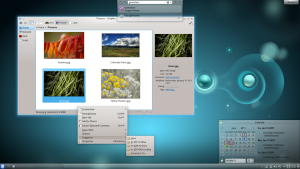 Visual updates include a new Oxygen icon themeThe latest stable release of KDE’s Plasma Workspaces and Applications brings new features and improvements all around. Highlights include :
Visual updates include a new Oxygen icon themeThe latest stable release of KDE’s Plasma Workspaces and Applications brings new features and improvements all around. Highlights include :
- A cleaner default look to Dolphin
- Gwenview’s new ability to compare two or more images
- New breadcrumb feature in the Kickoff menu that simplifies navigating submenus
- More improvements in the Network Management widget
More information on the Plasma and applications pages.
11.10 will have KDE SC version 4.7.1; Due to its very recent release, the latest version, 4.7.2, will be available in our updates PPA until it is available in the standard repositories.
Kontact 4.7
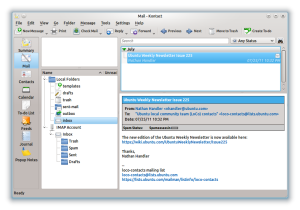 IMPORTANT: Do note that this is a major upgrade to the mail, calendar and addressbook systems, and as such still needs usage and migration testing. While loss of data should not be an issue, it is highly recommended for current Kontact users to back up all important data, mail, contact information and calendars if you plan to upgrade to 11.10.Kubuntu 11.10 brings you the new Kontact suite, which includes the Kmail 2. The look and feel is familiar, but under the hood, most of the applications have been updated to use the Akonadi storage service. This will enable better email, calendar, and other PIM activities moving forward.
IMPORTANT: Do note that this is a major upgrade to the mail, calendar and addressbook systems, and as such still needs usage and migration testing. While loss of data should not be an issue, it is highly recommended for current Kontact users to back up all important data, mail, contact information and calendars if you plan to upgrade to 11.10.Kubuntu 11.10 brings you the new Kontact suite, which includes the Kmail 2. The look and feel is familiar, but under the hood, most of the applications have been updated to use the Akonadi storage service. This will enable better email, calendar, and other PIM activities moving forward.
Our KMail2 page has more information on the migration process, the issues involved and how to import your previous data instead of migrating.
Amarok Improvements
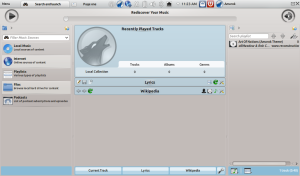 For more information have a look at the release announcements of Amarok 2.4.1 and 2.4.3.This new and improved version of the default music player features native support for remote NFS & SMB/CIFS collections, a better looking user interface, support for gpodder.net, as well as vastly improved reliability.
For more information have a look at the release announcements of Amarok 2.4.1 and 2.4.3.This new and improved version of the default music player features native support for remote NFS & SMB/CIFS collections, a better looking user interface, support for gpodder.net, as well as vastly improved reliability.
Test Drive OpenGL ES Powered Desktop Effects
For those adventurous and curious, we have packaged the work towards using the mobile friendly OpenGL ES.
To try running your system desktop effects on OpenGL ES install kde-window-manager-gles. More information can be found on Martin Gräßlin’s blog.
New from Kubuntu
Muon Suite 1.2
The Kubuntu team is proud to present our new suite of tools for installing and managing software. Installing of .deb packages, updating, and software management is all part of this new, integrated suite, specifically designed to work with Debian style package management. Check out Jonathan Thomas’s Blog for more info.
Muon Software Center
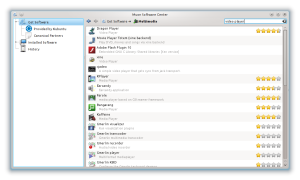 Muon Package ManagerAccessing thousands of free applications for your computer has never been easier. The Muon Software Center provides an easy-to-use way to access extra applications, games and accessories to further customize your desktop. Applications come with ratings and reviews for each application from the wider Ubuntu community, as well as with screenshot previews to help you make informed decisions.
Muon Package ManagerAccessing thousands of free applications for your computer has never been easier. The Muon Software Center provides an easy-to-use way to access extra applications, games and accessories to further customize your desktop. Applications come with ratings and reviews for each application from the wider Ubuntu community, as well as with screenshot previews to help you make informed decisions.
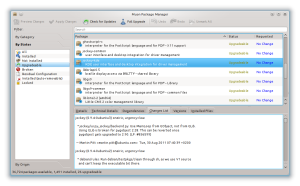 Low-Fat SettingsFor the budding system administrator, the Muon Package Manager provides a powerful feature set with a usability-driven interface. With its lightning-fast quick-search and extensive filtering abilities, you should have no trouble finding exactly the right package. From selective upgrades to package pinning to mass package removal, the Muon Package Manager should give you every tool you need to quickly and efficiently administer your system.
Low-Fat SettingsFor the budding system administrator, the Muon Package Manager provides a powerful feature set with a usability-driven interface. With its lightning-fast quick-search and extensive filtering abilities, you should have no trouble finding exactly the right package. From selective upgrades to package pinning to mass package removal, the Muon Package Manager should give you every tool you need to quickly and efficiently administer your system.
Kubuntu introduces Kubuntu-Low-Fat-Settings: a collection of configuration options that reduce memory usage and even speed up KDE’s loading time. This will help Kubuntu run better on older, lower-end systems.
Some of the many tweaks include :
- Turning off compositing by default.
- Disabling the automatic loading of various modules, such as bluedevil, the free space notifier, some Nepomuk services, and a other components.
- Reducing the number of default Krunner plugins that are loaded automatically.
- Reducing the amount of graphical effects used in the window decoration.
- Significant reductions in memory usage (up to 32%) and the subsequent savings in KDE’s loading time (up to 33%) can be had simply by installing the package kubuntu-low-fat-settings!
From the Ubuntu Community
Read the Ubuntu 11.10 Technical Overview for the updates on kernel drivers, better backwards compatibility for 64-bit machines, and other improvements.
Known Problems
639933 Some users may experience issues while updating from a previous version to the beta. There are proposed fixes for those brave enough to ignore the issue until officially resolved.
805906 Shutdown in the live session under VirtualBox sometimes does not work and seems to just hang on the desktop. Just restart the computer with the power button in that case, there is no possibility of data loss.
KDE Bug 275469: A window may retain a taskbar entry after closing the application.
Migration to KMail 2 does not work, see KMail 2 migration.
Feedback
We want to hear your opinions about Kubuntu 11.10.
- Do we [Ama]Rock?
- Did a feature make or break your day?
- What do you flat-out dislike?
Take a look at the Ubuntu Code of Conduct, try Kubuntu 11.10 and head on over to the Feedback Page. Your input is an invaluable resource, so do take the time to write down your thoughts and let us know what you think!
